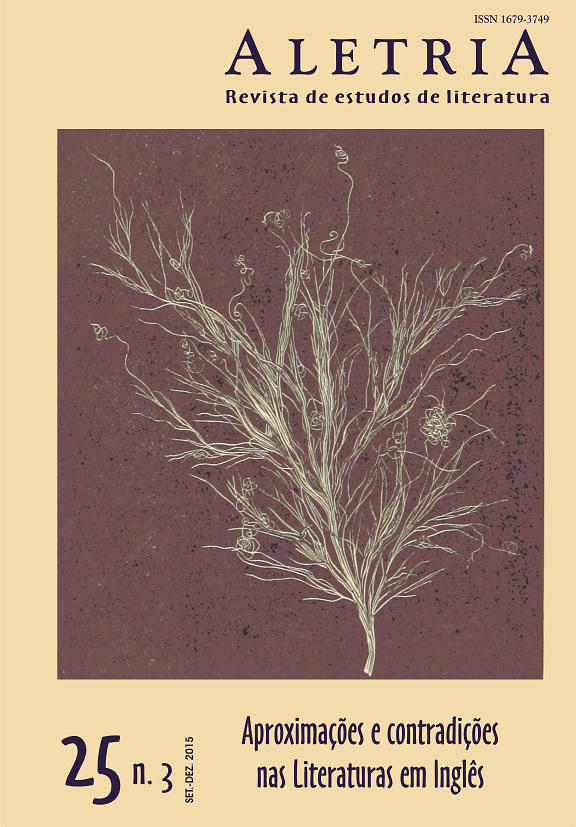Motherhood in Toni Morrison’s Sula and A Mercy: Rethinking (M)Othering
DOI:
https://doi.org/10.17851/2317-2096.25.3.67-84Keywords:
Motherhood, black mothers, Sula, A Mercy, Toni MorrisonAbstract
Motherhood tends to elicit strong feelings in women as well as a passionate rhetoric in our cultural discourse. Daughters have extensively been the focus of studies about mother-daughter bonds. Surprisingly, much less attention has been given to mother figures. By tracing the theme of motherhood in Sula (1973) and A Mercy (2009), I investigate how Toni Morrison rewrites the experiences of black mothers during slavery and its aftermath in the United States. Drawing mainly on feminist and black feminist theories, I explore, through literary analysis, how motherhood assumes various forms in both novels. The comparative analysis of Sula and A Mercy challenges distorted views commonly associated with the black mother and extends notions of mothering beyond biological determinants.
Downloads
References
ANDERSON, Mary Louise. Black matriarch: portrayals of women in three plays. Negro American Literature Forum, v. 10, n. 3, p. 93-95, 1976. Available from: http://www.jstor.org . Retrieved on July 2015.
COLLINS, Patricia Hill. Black feminist thought: knowledge, consciousness, and the politics of empowerment. New York; London: Routledge, 2000.
DAVIES, Carole Boyce. Black women, writing and identity: migrations of the subject. New York; London: Routledge, 1994.
ECKARD, Paula Gallant. Maternal body and voice in Toni Morrison, Bobbie Ann Mason, and Lee Smith. Columbia, Missouri: University of Missouri Press, 2002.
FERGUSON, Rebecca Hope. Rewriting black identities: transition and exchange in the novels of Toni Morrison. Brussels: Peter Lang, 2007.
FOUCAULT, Michel. Truth and power. Ed. C. Gordon. Michel Foucault: power/knowledge. United Kingdom: Harvester, 1980.
GOGOI, Hasnahana. Negotiating black motherhood in Toni Morrison’s Beloved and A Mercy: reading the slave/neo-slave narratives. Saarbrücken: Lambert Publishing, 2012.
HENDERSON, Mae C. Pathways to fracture: African American mothers and the complexities of maternal absence. Black Women, Gender, and Families, v. 3, n. 2, p. 29-47, 2009. Available from: http://muse.jhu.edu. Retrieved on May 2015.
HIRSH, Marianne. Maternal narratives: cruel enough to stop the blood. In: Gates Jr., Henry Louis (Ed.). Reading black, reading feminist: a critical anthology. New York: Meridian, 1990.
HOOKS, Bell. Yearning: race, gender, and cultural politics. Boston: South End, 1990.
JOSEPH, Gloria. Black mothers and daughters: their roles and functions in American society. In: Joseph, Gloria; Lewis, Jill (Ed.). Common differences: conflicts in black and white feminist perspectives. Boston: South End Press, 1981.
MORRISON, Toni. A Mercy. New York: Alfred A. Knoff, 2009.
MORRISON, Toni. Sula. New York: Penguin, 1973.
O’REILLY, Andrea. Toni Morrison and motherhood: a politics of the heart. New York: State University of New York Press, 2004.
PUTNAM, Amanda. Mothering violence: ferocious female resistance in, Toni Morrison’s. The bluest eye, Sula, Beloved and A Mercy. Black Women, Gender, and Families, v.5, n. 2, p. 25-43, 2011. Available from: http://muse.jhu.edu. Retrieved on May 2015.
RICH, Adrienne. Of woman born: motherhood as experience and institution. 2nd ed. New York; London: W. W. Norton & Company, 1986.
SELVI, Vinayaka. Mothering at the margins: the politics of mothering in the novels of Gloria Taylor, Toni Morrison and Alice Walker. Saarbrücken: Lambert Publishing, 2012.
WAGNER-MARTIN, Linda. Toni Morrison and the maternal: from the Bluest Eye to Home. New York: Peter Lang Publishing, 2014.
Downloads
Additional Files
Published
How to Cite
Issue
Section
License
Copyright (c) 2016 Natália Fontes de Oliveira (Autor)

This work is licensed under a Creative Commons Attribution 4.0 International License.
Authors who publish with this journal agree to the following terms:Authors retain copyright and grant the journal right of first publication with the work simultaneously licensed under a Creative Commons Attribution Non-Commercial No Derivatives License that allows others to share the work with an acknowledgement of the work's authorship and initial publication in this journal.Authors are able to enter into separate, additional contractual arrangements for the non-exclusive distribution of the journal's published version of the work (e.g., post it to an institutional repository or publish it in a book), with an acknowledgement of its initial publication in this journal.Authors are permitted and encouraged to post their work online (e.g., in institutional repositories or on their website) prior to and during the submission process, as it can lead to productive exchanges, as well as earlier and greater citation of published work (See The Effect of Open Access).





